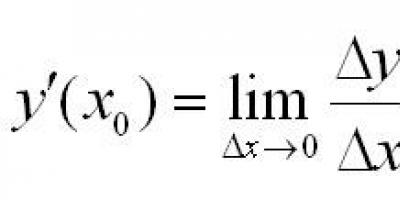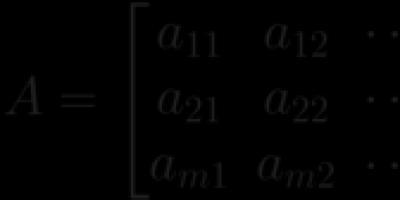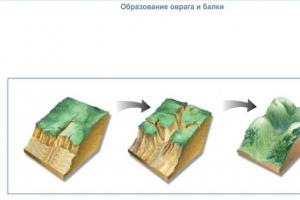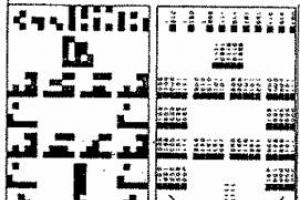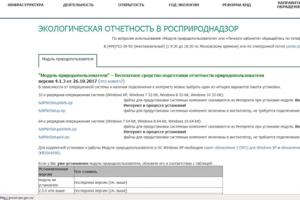The grammatical basis of the sentence. The concept of the main members of a sentence
The grammatical basis of a sentence consists of a subject and a predicate.
The grammatical basis expresses the grammatical meanings of a sentence. They are associated with the meanings of moods and tense of the predicate verb.
The troops are moving to the front.
(The action actually happens and takes place in the present tense).
Yesterday he came to see us.
(The action actually happened, but in the past tense).
You should talk to your mother, Ivan!
(The action is not realized in reality, but is desired by the speaker).
The subject and predicate are called the main members of a sentence because all the minor members in a sentence directly or indirectly extend them.
Let us show the dependence of the minor terms on the main ones in the following diagram:
The astonished Varenukha silently handed him an urgent telegram.
Subject as a member of a sentence. Subject expression forms
The subject is the main member of the sentence, which denotes the subject of speech and answers the questions of the nominative case who? or what?
The subject in Russian can be expressed in different ways, sometimes in “unusual” forms. The following table will help you correctly determine the subject.
Basic ways of expressing the subject.
| Part of speech in subject position | |
| Noun in i. P. | Language reflects the soul of the people. |
| Pronoun in i. P. | He left. Who was there? This is right. This is my brother (for questions: who is this?) The house, which was barely standing, belonged to a forester. (Here, pay attention to the subject of the subordinate clause.) The sparks that flew from the fire seemed white. (Here, pay attention to the subject of the subordinate clause.) Someone has come. Everyone fell asleep. |
| Infinitive | Being honest is half the battle. To understand means to sympathize. Smoking is harmful to health. |
| Combination of words (one of which is in i.p.) | He and I visited there often. Two clouds float across the sky. |
| A combination of words without and. P. | About an hour passed. |
Predicate as a member of a sentence. Types of predicate
The predicate is the main member of a sentence, which is connected with the subject by a special connection and has a meaning expressed in the questions what does the subject of speech do? what's happening to him? what is he like? what is he? who is he? and etc.
The predicate in Russian can be simple or compound. A simple (simple verbal) predicate is expressed by one verb in the form of some mood.
Compound predicates are expressed in several words, one of them serves to connect with the subject, while the others carry the semantic load. In other words, in compound predicates, the lexical and grammatical meanings are expressed in different words.
(Verb was Colonel
(Verb started serves to connect with the subject, to the word work the semantic load of the predicate decreases.)
Among compound predicates, a distinction is made between compound verbal and compound nominal predicates.
Learn more about predicate types. Simple verb predicate
A simple verbal predicate is expressed by one verb in the form of some mood.
It can be expressed by the following verb forms:
| Present and past tense forms of the verb. |
|
| Future tense form of the verb. | |
| Forms of the conditional and imperative mood of the verb. |
We emphasize that in the case of you will be expected tomorrow, the simple verbal predicate is expressed by the compound form of the future tense of the verb to wait.
Compound verb predicate
A compound verbal predicate consists of two components - an auxiliary verb, which serves to connect with the subject and expresses the grammatical meaning of the predicate, and an indefinite form of the verb, which expresses its main lexical meaning and carries the main semantic load.
(Here began - this is an auxiliary verb, and gnawing is an indefinite form of a verb that carries a semantic load.)
(Here I don’t want is an auxiliary verb, and to offend is an indefinite form of a verb that carries a semantic load.)
The role of an auxiliary verb can be a combination of some short adjectives (must, glad, ready, obligated, etc.) and an auxiliary verb-linking be in the form of one of the moods (in the present tense this linking is omitted).
(here the copula will be omitted).
So, let’s imagine the structure of a compound verbal predicate with the formula:
| CONDITION VERB SKAZ. = AUXILIARY VERB + UNDEFINED FORM |
Compound nominal predicate
A compound nominal predicate consists of two components: a copular verb that serves to connect with the subject and expresses the grammatical meaning of the predicate, and a nominal part that expresses its main lexical meaning and carries the main semantic load.
(Here the copular verb becomes, and the nominal part is expressed by the adjective viscous.)
(Here the copular verb will be, and the nominal part of the predicate is expressed by the noun handball player.)
Let us imagine the structure of a compound nominal predicate with the formula:
| CONDITION NAME SKAZ. = CONNECTION. VERB + NAME PART |
The nominal part of a compound nominal predicate is expressed by the following parts of speech: noun, adjective (full and short, various forms of degrees of comparison), participle (full and short), numeral, pronoun, adverb, word of the state category, verb in the indefinite form.
In the Russian language, at least four main types of one-part sentences can be distinguished.
Basic types of two-part sentences
| Form of expression of subject and predicate | Examples |
| The subject is expressed by a noun or a pronoun in the nominative case, the predicate - by a specific form of the verb. | |
| The subject is expressed by a noun or pronoun in the nominative case, the predicate - by a noun in the nominative case. In the past and future tenses, a linking verb appears and the case of the predicate changes to instrumental. | |
| The subject is expressed by the indefinite form of the verb or a phrase based on it, the predicate - also by the indefinite form of the verb. Particles are possible between the subject and the predicate, this means. | |
| The subject is expressed by the indefinite form of the verb or a phrase based on it, the predicate - by an adverb. | |
| The subject is expressed by the indefinite form of the verb or a phrase based on it, the predicate - by a noun in the nominative case or a phrase based on it. In the past and future tenses, a linking verb appears and the case of the predicate changes to instrumental. | |
| The subject is expressed by a noun in the nominative case, the predicate - by the indefinite form of the verb or a phrase based on it. A linking verb appears in the past and future tenses. | |
| The subject is expressed by a noun in the nominative case, the predicate - by an adjective or participle (full or short) in the nominative case. In the past and future tenses, a linking verb appears in the predicate. |
Knowing the main types of two-part sentences, it is easier to find grammatical basics in them.
Basic types of one-part sentences
| Typical form and meaning | ||
| Nominative (nominative) sentences | These are sentences where the main member is expressed by a noun or a pronoun-noun in the form of the nominative case. This main member is considered the subject and indicates that there is no predicate in the nominative sentence. Nominative sentences usually report that some phenomenon or object exists (are) in the present. | Large area in the city. Here's a bench. |
| Definitely personal proposals | The predicate is expressed by a verb in the 1st or 2nd person form. The ending of the verb in these cases clearly indicates the person and number of the pronoun (I, we, you, you). There is no need to use these pronouns as subjects. | |
| Vaguely personal proposals | The predicate is expressed by a verb in the 3rd person plural form (in the present and future tense) or in the plural form (in the past tense). In such sentences, the action itself is important, and the doer is either unknown or unimportant to the speaker, so there is no subject in them. |
|
| Impersonal offers | These are sentences in which there is not and cannot be a subject, since they denote actions and states that are thought to occur “by themselves,” without the participation of an active agent. According to their form, these sentences are divided into two types: with a verbal predicate and with a predicate - a word of the state category. The verbal predicate can be expressed by a verb in the 3rd person singular form (in the present and future tense) or in the neuter singular form (in the past tense). This role is usually played by impersonal verbs or verbs in impersonal use. The verb predicate can also be expressed by the infinitive form of the verb. | To avoid freezing, she captured jacket |
| In addition, the predicate in an impersonal sentence can be the word No. |
The owners are not at home. |
Secondary members of the sentence: definition, addition, circumstance
All members of the sentence, except the main ones, are called secondary.
The secondary members of the sentence are not included in the grammatical basis, but extend (explain) it. They can also explain other minor members.
Let's demonstrate this with a diagram:

According to their meaning and role in the sentence, minor members are divided into definition, addition and circumstance. These syntactic roles are recognized by questions.
Appreciated (to what extent?) high- circumstance.
Appreciated (what?) canvases- addition.
Canvases (whose?) his- definition.
Supplement as part of a sentence. Types of add-ons
A complement is a minor member of a sentence that answers questions of indirect cases (i.e., all except the nominative) and denotes the subject. The object usually extends the predicate, although it can also extend other members of the sentence.
I enjoy reading (what?) magazines. (Here the addition logs extends the predicate.)
Reading (what?) magazines is a fascinating activity. (Here the journals complement extends the subject.)
Objects are most often expressed by nouns (or words in the function of nouns) and pronouns, but can also be represented by an indefinite form of a verb and complete phrases.
During the campaign he shaved with (what?) a bayonet. (Here the complement bayonet is expressed by a noun.)
This is understandable only to connoisseurs of (what?) beauty. (Here the complement of beauty is expressed by an adjective in the role of a noun.)
And I will ask you (about what?) to stay. (Here the complement to remain is expressed by the infinitive form of the verb.)
He read (what?) a lot of books. (Here the addition of many books is expressed by a combination that is integral in meaning.)
Additions can be direct or indirect.
Direct objects belong to transitive verbs and denote the object to which the action is directly directed. Direct objects are expressed in the accusative case without a preposition.
I don’t know when I’ll see my relatives now (v.p.).
These furnaces used to melt steel (v.p.).
All other additions are called indirect.
Play the piano (p.p.).
I put the bread on the table (v.p. with a preposition).
I was forbidden to worry (expressed in the infinitive form of the verb).
In order not to make mistakes in placing punctuation marks, you need to understand the structure of the sentence, that is, be able to quickly find the grammatical basis. This is exactly what our article is about.
What is a grammatical basis
The grammatical basis of a sentence is a subject and a predicate; this is the semantic center of the phrase. It is this that contains the main meaning that needs to be conveyed. In most cases, the grammatical basis is independent: if all minor members are excluded, the essence of the sentence will still be clear.
This is also the grammatical center, because it is the predicate that connects the sentence with time and reality.
What does the grammatical basis consist of?
In a two-part sentence, the grammatical basis consists of two main members - the subject and the predicate. The subject names what is said in the sentence, and the predicate names what is told to us about the subject.
In 3rd grade, in Russian language lessons, studying this topic, they study the simplest and most common type of grammatical basis, when the subject is expressed by a noun or pronoun, and the predicate by a verb in personal form.
How can the subject be expressed?
The subject can be expressed by a noun or pronoun, an infinitive, a combination of a noun with a cardinal number (two brothers), a syntactically indivisible combination (kindergarten), etc.
How can a predicate be expressed?
There are three types of predicates:
- in a simple verb predicate– verb in any form except the infinitive;
- in a compound verb the infinitive of the semantic verb and the auxiliary verb(modal or phase) or a short adjective with a modal meaning - to express the grammatical meaning;
- in a compound nominal linking verb “to be”(or “semi-link” to seem, become, etc.) and the nominal part, which can be expressed by anything other than a verb in the personal form or a gerund.
If the subject and predicate are expressed as nouns, numerals or infinitives (in any set), then a dash is often placed between them; There are exceptions to the rule. Here is an example of a diagram of the grammatical basis of a sentence with a dash: ̲ - this is ̳.
There cannot be a comma between the subject and the predicate; unless there are two distinguishing marks, but then there must be two of them!
The basis of a one-part sentence
In a one-part sentence, the grammatical basis consists of only the predicate or (rarely) only the subject.
Sometimes you can come across the opinion that this is not a subject or a predicate, but a special member of a sentence.
There are several types of one-part sentences depending on how the main member is expressed.
Common and non-common sentences
In common sentences, in addition to the grammatical basis, there are also secondary members: additions, definitions, circumstances. In the uncommon there is only a grammatical basis.
What have we learned?
The grammatical basis is the core of a sentence, its grammatical structure and meaning. The type of sentence depends on the number of main members in the basis: if the basis is two members, the sentence is two-part, if the basis is one, it is one-part. In a common sentence there are also minor members, in a non-common sentence there is only one grammatical basis. The main members can be expressed by many parts of speech or combinations. Depending on this, the type of predicate is determined. There can be a dash between the subject and the predicate, but not a comma.
Test on the topic
Article rating
Average rating: 4.4. Total ratings received: 187.
As part of the grammatical basis there are subject and predicate. If a sentence consists of one main member, then it is only a subject or predicate. There are no sentences without a basis (except for incomplete ones)!
Stage No. 1. We find the subject. Questions WHO? or WHAT?
The subject is the main member of the sentence, grammatically independent.
In a typical sentence, this is the thing (in the broad sense) that the sentence is talking about. This is a word in the nominative case. Most often this is a noun or pronoun that answers the questions: Who? or What?
Examples:
- Wolf came out of the forest (What or what is the sentence talking about? About a wolf, that is, we pose the question: Who? Wolf. Noun).
- Shaggy black dog suddenly jumped out from somewhere out of the sedge thickets (Who? Dog. Noun).
- I smiled and went forward. (Who? I. Pronoun).
There are some cases where the subject is expressed in other ways (not as a noun or as a pronoun):
|
Other ways of expressing the subject |
Examples |
|
Numeral (quantitative and collective) as a noun |
Three came out of the forest. |
|
Adjective as a noun |
Well-fed not a companion for the hungry. |
|
Participle as a noun |
Vacationers had a fun time. Will make it through the road going. |
|
Tomorrow will definitely come. |
|
|
Interjection |
It thundered in the distance hooray. |
|
Collocation |
We are with friends we left earlier. Quite a few schoolchildren participated in the competition. |
|
Infinitive |
compose- my passion. |
Stage No. 2. We find the predicate. Questions: WHAT DOES IT DO? (and etc.)
What are the predicates?
The predicate is connected with the subject and answers the question that is asked to it from the subject: What does the subject do?
But with the appropriate expression of the subject (see table above), these can be other questions: What is the subject?, What is the subject), etc.
Examples:
- Wolf came out of the forest (We ask a question from the actor, from the subject: what did the wolf do? Came out - this is a predicate expressed by a verb).
- Shaggy black dog suddenly jumped out from somewhere out of the sedge thickets (What did the dog do? Jumped out).
- I smiled and went forward. (What I did was smile and go).
Predicates in Russian are of three types:
- Simple verb (one verb). Example: The wolf came out.
- Compound verb (auxiliary verb + infinitive). Example: I'm hungry. I have to go to Suzdal (essentially two verbs in the predicate).
- Compound nominal (linking verb + nominal part). Example: I will be a teacher (essentially a verb and another part of speech in the predicate).
see also:
- Materials on the topic: and "".
Difficult cases in determining predicates
Situation 1. Often problems with determining the predicate arise in a situation where a simple verbal predicate is expressed in more than one word. Example: Today you will not have lunch alone (= have lunch).
In this sentence, the predicate will dine is a simple verb, it is expressed in two words for the reason that it is a compound form of the future tense.
Situation 2. I found myself in difficulty doing this work (= found it difficult). The predicate is expressed by phraseological units.
Situation 3. Another difficult case is in sentences in which the compound predicate is represented by a short participle form. Example: The doors are always open.
An error in determining the type of predicate may be associated with an incorrect definition of the part of speech (a short participle should be distinguished from a verb). In fact, in this sentence the predicate is a compound nominal, and not a simple verb, as it might seem.
Why is it compound if it is expressed in one word? Because in the present tense form the verb has a zero connective. If you put the predicate in the form of the past or future tense, it will appear. Compare. Doors are always will open. Doors are always were open.
Situation 4. A similar error can occur in the case of expressing the nominal part of a compound nominal predicate with a noun or adverb.
Example. Our hut is the second from the edge. (Compare: Our hut was the second one from the edge).
Dasha is married to Sasha (Compare: Dasha was married to Sasha).
Remember that words are part of a compound predicate possible, necessary, impossible.
Determining the stem in one-part sentences
In nominative sentences, the stem will be represented by the subject.
Example: Winter morning.
In indefinite sentences there is only a predicate. The subject is not expressed, but it is understandable.
Example: I love the storm in early May.
The most difficult case of expressing the stem in impersonal sentences. Most often these are just different types of compound nominal predicates.
Examples: I need to act. The house is warm. I'm upset. There is no comfort, no peace.
If you do not develop the skill of determining the basis of a sentence in the early grades, this will lead to difficulties in analyzing single-part and complex sentences in grades 8-9. If you gradually develop this skill by increasing complexity, then all problems will be resolved.
Concept "grammatical basis" is inextricably linked with the sentence - one of the main syntactic units of the Russian language. Let's find out what is the core of the sentence.
Each sentence has its own core, around which the rest of its members are grouped. This grammatical core consists of the main members - the subject and predicate in a two-part sentence or only the subject or predicate in a one-part sentence, for example:
Twilight. It's early evening. We swam quite slowly (I.S. Turgenev).
What is the grammatical basis of a sentence
The sky was darkening- the grammatical basis of a simple sentence.
Who? we are the subject expressed by a personal pronoun in the nominative plural form.
What did we do? swam - predicate.
Examples of expressing the subject using different parts of speech
Three (numeral) slipped unnoticed into the yard.
Finally the long-awaited day after tomorrow has arrived (adverb).
To protect (infinitive) nature means to protect the Motherland.
Several children (numeral + noun) surrounded her with expressions of delight on their faces.
The girl is singing. The girl was singing. The girl will sing.
Will you live in this house?
We won't talk about the past.
Let the children of the whole Earth rejoice!
Let her go into the garden.
glad, ready, must, obliged, forced, intends.
The lecturer continued to present interesting facts from the life of insects.
You must tell me about this incident.
Father and mother decided to go to the village the next day.
The forester could not refuse the guests and took them to the lake where the swans lived.
The girl had the intention of coming closer and examining this exotic flower more carefully.
Compound nominal predicate consists of a linking verb expressing the grammatical meaning of the predicate, and a nominal part (noun, adjective, pronoun, numeral, etc.) expressing the lexical meaning.
The word can act as a linking verb "be" in any form (will, will, will, was, would be, is). The ligament may be missing. In this case, we speak of a zero copula.
The juniper alley will be like a path in the forest.
Video lesson “The grammatical basis of a sentence. The main members of the proposal"
Offer is the smallest unit of communication. With the help of sentences, we express our thoughts and feelings, turn to each other with questions, advice, requests, wishes and orders.
The waters flowed quietly.
What? - sky. This is a subject, which, as a rule, is expressed by a noun (pronoun) in the nominative case form or any part of speech in the meaning of a noun.
A snowstorm (noun) arrived immediately (N. Ostrovsky).
I (pronoun) was driving alone in the evening on a racing droshky (I.S. Turgenev)
Smart (adjective) speaks for itself by its actions.
Those who arrived (communion) noisily sat down at the tables.
The bonds of friendship (phrase) connected them since childhood.
Let's discuss our plans.
Examples of a compound verb predicate
You are just starting to live!
The rain stopped falling and the bright sun came out.
Who told you to pick flowers in my garden?
Those gathered wanted to hear an old song.
Everyone is happy to help you.
The Greeks believed that the world is harmony and rhythm.
Mercury is also a metal.
russkiiyazyk.ru
The round dances were already leaving; A fisherman’s fire was already burning across the river, smoking (A.S. Pushkin).
To highlight the grammatical basis of a sentence, let’s find out who or what the statement is about. To do this, let's ask questions: Who? or What?
What does it say about heaven? What was the sky doing? faded- this is a predicate.
We were sailing- grammatical basis.
He who (pronoun) does not work, does not eat.
Nine (numeral) is divisible by three.
Loud cheers (interjection) echoed across the square.
The second main component of the grammatical basis is the predicate, which can be expressed by all conjugated forms of the verb. Such a predicate is called a simple verb - PGS.
The difficulty of isolating such a predicate is that it can be expressed by two words that make up complex forms of a future tense verb in the indicative mood or forms of the imperative mood, for example:
When will you have breakfast?
My friend won't talk about it.
Compound verb predicate(SGS) consists of an auxiliary linking verb and an infinitive.
The auxiliary verb does not have an independent lexical meaning, but expresses the beginning, continuation or end of an action (phasic verb) or denotes opportunity, desire, expression of will, obligation, evaluation, etc. (modal verb).
Short adjectives can also act as connectives:
Particularly difficult are the GHS, which contain stable phrases with a modal meaning:
We are ready to leave immediately.
I had no right to take risks and therefore walked through the swamp carefully.
The water near the shores of the lake was crystal clear.
The order of highlighting grammatical bases
The diagram presented below will help you learn how to correctly highlight the grammatical bases of a sentence.

How to determine the grammatical basis? Explanation of sentence parsing, complex cases

The grammatical basis of a sentence (subject and predicate) is its semantic and syntactic center. The chain of syntactic parsing begins with the definition of the grammatical basis. The ability to correctly determine the grammatical basis in a sentence provides direction for establishing logical relationships between words in a sentence and helps solve punctuation problems (including when learning a foreign language). If the grammatical basis was determined incorrectly, then all further analysis will go along the wrong path.
As part of the grammatical basis there are subject and predicate. If a sentence consists of one main member, then it is only a subject or predicate. There are no sentences without a basis (except for incomplete ones)!
Stage No. 1. We find the subject. Questions WHO? or WHAT?
The subject is the main member of the sentence, grammatically independent.
In a typical sentence, this is the thing (in the broad sense) that the sentence is talking about. This is a word in the nominative case. Most often this is a noun or pronoun that answers the questions: Who? or What?
- Wolf came out of the forest (What or what is the sentence talking about? About a wolf, that is, we pose the question: Who? Wolf. Noun).
- Shaggy black dog suddenly jumped out from somewhere out of the sedge thickets (Who? Dog. Noun).
- I smiled and went forward. (Who? I. Pronoun).
- Wolf came out of the forest (We ask a question from the actor, from the subject: what did the wolf do? Came out - this is a predicate expressed by a verb).
- Shaggy black dog suddenly jumped out from somewhere out of the sedge thickets (What did the dog do? Jumped out).
- I smiled and went forward. (What I did was smile and go).
- Simple verb (one verb). Example: The wolf came out.
- Compound verb (auxiliary verb + infinitive). Example: I'm hungry. I have to go to Suzdal (essentially two verbs in the predicate).
- Compound nominal (linking verb + nominal part). Example: I will be a teacher (essentially a verb and another part of speech in the predicate).
There are some cases where the subject is expressed in other ways (not as a noun or as a pronoun):
Other ways of expressing the subject
Examples
Numeral (quantitative and collective) as a noun
Three came out of the forest.
Adjective as a noun
Well-fed not a companion for the hungry.
Participle as a noun
Vacationers had a fun time.
Will make it through the road going.
Tomorrow will definitely come.
It thundered in the distance hooray.
We are with friends we left earlier.
Quite a few schoolchildren participated in the competition.
Infinitive
compose- my passion.
Stage No. 2. We find the predicate. Questions: WHAT DOES IT DO? (and etc.)
What are the predicates?
The predicate is connected with the subject and answers the question that is asked to it from the subject: What does the subject do?
But with the appropriate expression of the subject (see table above), these can be other questions: What is the subject?, What is the subject), etc.
Examples:
Predicates in Russian are of three types:
see also:

Difficult cases in determining predicates
Situation 1. Often problems with determining the predicate arise in a situation where a simple verbal predicate is expressed in more than one word. Example: Today you will not have lunch alone (= have lunch).
In this sentence, the predicate will dine is a simple verb, it is expressed in two words for the reason that this is a compound form of the future tense.
Situation 2. I found myself in difficulty doing this work (= found it difficult). The predicate is expressed by phraseological units.
Situation 3. Another difficult case is in sentences in which the compound predicate is represented by a short participle form. Example: The doors are always open.
An error in determining the type of predicate may be associated with an incorrect definition of the part of speech (a short participle should be distinguished from a verb). In fact, in this sentence the predicate is a compound nominal, and not a simple verb, as it might seem.
Why is it compound if it is expressed in one word? Because in the present tense form the verb has a zero connective. If you put the predicate in the form of the past or future tense, it will appear. Compare. Doors are always will open. Doors are always were open.
Situation 4. A similar error can occur in the case of expressing the nominal part of a compound nominal predicate with a noun or adverb.
Example. Our hut is the second from the edge. (Compare: Our hut was the second one from the edge).
Dasha is married to Sasha (Compare: Dasha was married to Sasha).
Remember that words are part of a compound predicate possible, necessary, impossible.
Determining the stem in one-part sentences
In nominative sentences, the stem will be represented by the subject.
Example: Winter morning.
In indefinite sentences there is only a predicate. The subject is not expressed, but it is understandable.
Example: I love the storm in early May.
The most difficult case of expressing the stem in impersonal sentences. Most often these are just different types of compound nominal predicates.
Examples: I need to act. The house is warm. I'm upset. There is no comfort, no peace.
If you do not develop the skill of determining the basis of a sentence in the early grades, this will lead to difficulties in analyzing single-part and complex sentences in grades 8-9. If you gradually develop this skill by increasing complexity, then all problems will be resolved.
Thank you for your mark. If you want your name
became known to the author, log in to the site as a user
and press Thank you again. Your name will appear on this page.
Have an opinion?
Leave a comment

You can post an announcement of an article on your website with a link to its full text.
Grammar basis of a sentence with examples
Grammar basis sentences form the main members of the sentence ( subject and predicate). That is, the grammatical basis of a sentence (predicative basis, core) is the main part of the sentence, which consists of its main members: subject and predicate. See also introductory words. After reading this article 5-ege.ru, you can easily find it in any sentence.
Subject.
Subject can be expressed not only by a noun or pronoun in nominative case, but also:
Seven (num.) one is not expected. All the past (adj. as a noun) I was just dreaming.
- numeral / several, many, part, majority, minority + noun in R.P.;
A lot of people gathered in the prince’s hut. Several ladies walked quickly up and down the platform.
- some, everyone, many / adjective + of + noun in R.P.;
Best of Students quickly solved this problem.
- someone, something + adjective, participle as a noun;
Something so insignificant tied in a scarf.
- noun / pronoun + s + noun / pronoun in Tv.P. ( but only if the predicate is expressed by a plural verb!).
Vanya and I went along the forest road ( plural predicate.).
Anna she entered the room with her daughter in her arms (predicate in singular).
Live in a lordly way - this is a noble affair
Predicate.
In the Russian language there are three types of predicates. The following algorithm of actions will help you determine which type is represented in your proposal.
Distinguish!
If a sentence contains homogeneous predicates, then each of them should be considered separately. 
Also watch the video presentation.
Clue.
1) Most often, the definition of a simple verbal predicate, expressed in more than one word, raises doubts:
I will take part in the exhibition.
In this example I will take part– a complex form of the future tense, which is defined in syntax as a simple predicate. And the combination participate is a phraseological unit that can be replaced by the word I'm participating. Therefore, we have a simple verbal predicate.
Trap!
People often make the mistake of calling the following construction simple verbal predicates:
Everything in Moscow is imbued with poetry, punctuated with rhymes.
This error is due to two factors.
First, we must distinguish the short passive participle from the past tense verb form.
Short participles have suffixes -T-, -N-, and the verb -L-. Means, soakedBut, puncturedTo- These are short passive participles.
Secondly, we have before us a predicate that is expressed in just one word, but what is it - simple or compound (see Morphological analysis of a word with examples)? Try adding some time adverb to the sentence, for example, at the beginning of the twentieth century, and see how these forms behave.
At the beginning of the twentieth century, everything in Moscow was imbued with poetry and punctuated with rhymes.
A bunch appears was and the predicate clearly becomes compound. The Russian language is not characterized by constructions in the present tense with a copula be. Agree, it sounds clearly foreign if we say: All in Moscow There is imbued with poetry, rhymes There is pierced.
Thus, if in a sentence you encounter predicates, expressed short passive participles, then you are dealing with compound nominal predicate.
Words it is impossible, it is possible, it is necessary, it is necessary included in composite predicates.
I need to get off at this stop.
Be careful with your words to be, to appear, to appear, since by highlighting only them, you may miss another component of the predicate.
She seemed funny to me. Wrong!
If you only highlight words appeared, then the meaning of the sentence changes completely ( seemed = dreamed, dreamed, imagined).
Right: She seemed funny to me
Wrong: The teacher was strict (was = existed, lived).
Right: The teacher was strict.
This task offers quite complex sentences for analysis and the answer options are very often similar to each other. What “traps” can you expect here?
1) Proposals can be compiled according to different models:
The answer option may omit a subject, a predicate, or one of the homogeneous subjects or predicates.
Remember!
The grammatical basis includes ALL the main parts of the sentence; omitting one of them is a clear mistake.
2) The answer option can combine the subject and predicate of different grammatical bases.
3) The subject can only be in I.P.! Answer options with nouns, pronouns not in I.P. obviously incorrect (except for those cases when they are part of the predicate and without them the whole meaning of the sentence changes).
4) The answer option may contain a participle or participial phrase, which are never included in the grammatical basis.
Designs should be distinguished verb + noun in V.P. And noun + passive participle.
The coordinates were calculated. ? The coordinates have been calculated.
IN first case coordinates is a noun in the accusative case that depends on the verb (i.e. addition), and in second is a nominative case form that agrees with the past participle (i.e. subject). If you change each of the designs, the differences will be visible. Let's put the predicates in each of the sentences in the singular form:
Calculated the coordinates. The coordinate has been calculated.
The subject and predicate always agree with each other, but the object remains unchanged.
5) Sometimes words which, which in complex sentences they are subjects.
[And shiny droplets crawled down his cheeks], (the kind that happen on windows when it rains). (what = droplets).
Analysis of the task.
1. Which combination of words is the grammatical basis in one of the sentences or in one of the parts of a complex sentence?
(1) So what is the difference between human and animal perception? (2) For an animal, only concrete things exist; its perception is inseparable from the real environment in which it lives and acts. (3) So, for example, the “TV version” of a dog means nothing to a cat. (4) Man, in the process of evolution, acquired the unique ability to create in his imagination ideal images of reality, but they no longer seem to be a direct copy of a specific thing. (5) Thanks to the development of cognitive activity, in particular, the processes of abstraction and generalization, a person can isolate any individual features of the object being studied, abstracting from all other, unimportant details. (6) Thus, a person has the ability to form a generalized image of a real thing, which allows him to see and recognize the common signs and qualities of various phenomena of reality.
1) perception is (sentence 2)
2) acquired the ability (sentence 4)
3) they do not appear to be a cast (sentence 4)
4) which allows you to see (sentence 6)
Option #1 is not a grammatical basis, since here the predicate is not fully represented, which distorts the meaning of the entire sentence (perception is = in the meaning “comes, arrives somewhere for some reason”). See point 3 in the “Predicate” section.
Option No. 2 is also incorrect because it lacks a subject. Who acquired the ability? In sentence 4 the subject is the word Human.
Option #3 true, although at first glance it seems wrong. The authors of the task are deliberately trying to confuse us. Although the word cast is not in the I.P. form, but it is part of the predicate, since without it the logic of the story is lost. They don’t introduce themselves = The images don’t give their names?!
Option No. 4 incorrect . The subject is highlighted correctly. Word which, as we have already said, can be subject. In the subordinate clause it is replaced by the word image and performs the same functions, that is, it is the subject. But the predicate is not fully represented. In the sentence it is - allows you to see and recognize.
Thus, the student who chooses option 3 will be right.
2. What words are the grammatical basis in the sixth (6) sentence of the text?
(1)… (2) They are united by one desire - to know. (3) And their ages are different, and their professions are very different, and their level of knowledge is completely different, but everyone tried to know more than they already know. (4) This expressed the need of millions and millions of people who greedily absorbed all the secrets of the world, all the knowledge and skills accumulated by mankind. (5) Library visitors either studied somewhere or dreamed of studying. (6) They all needed books, but when they came to the library, they got lost in the ocean of books. (7) ... (According to K. Chukovsky).
1) books were needed, they were lost
2) they needed it, they were lost
3) books were needed, when they came here they got lost
4) books were needed, they were lost in the ocean
The correct one is Option 1, since in other variants the second ones included minor members of the sentence in the base: in the second, the word is superfluous them (addition, stands in D.P.), in the third there is an adverbial phrase that is not part of the basis of the sentence, and in the fourth there is an adverbial phrase in the ocean.
3. What combination of words is the grammatical basis in one of the sentences (or part of it)?
(1)... (2) She will die of hunger if the gates are strong and no one opens them, but does not think of moving away from the gates and pulling them towards themselves. (3) Only a person understands that you have to be patient, work hard and do something you don’t want in order for what you want to happen. (4) A person can restrain himself, not eat, not drink, not sleep only because he knows what is good and should be done and what is bad and should not be done, and this is taught to a person by his ability to think. (5) Some people increase it in themselves, others do not. (6)…
1) she will die (sentence 2)
2) what you want (sentence 3)
3) what is good and should be done (sentence 4)
4) teaches ability (sentence 4)
This is a task of increased difficulty.
Option #1 incorrect, since not all predicates are indicated by the authors. The sentence has a rather difficult structure to analyze. It is complex with a subordinate clause that is wedged between two homogeneous predicates. Therefore, you may not notice that the basis she will die must also include a predicate won’t think to step back and pull.
Option No. 2 is also excluded. Verb I want to is impersonal and there cannot be a subject with it.
Option #3 similar to the previous one. This sentence is also impersonal. Word must in dictionaries it is defined as a category of state that is used in sentences without a subject.
True is Option 4.
Home » Preparation for the Unified State Exam in Russian » Grammar basis of a sentence with examples
At the center of the connections between the words of each sentence are words that create a grammatical basis (predicative), in fact, this is the main distinguishing feature of the sentence as a syntactic unit. That is, the grammatical basis is the organizing center, a kind of frame, skeleton, or the so-called main members of the sentence - the predicate and the subject. They are called the main ones for a reason, since they are grammatically independent from other members and occupy a dominant position in the sentence. The predicate and subject mutually presuppose each other. So, the subject names the subject of speech. And the subject of speech affirms, denies, characterizes by action, attribute, time, reality, etc.
Usually the main members of a sentence form its obligatory part. Some of them are enough for the sentence to be a grammatically and meaningfully formed unit. Often there are sentences where there is only a grammatical basis. Examples: The sun is shining. Children are playing. Such proposals are called non-common, because do not have secondary members of the sentence. If the sentence also includes other members of the sentence (minor), then such a sentence is called widespread, for example: On the street children are playing.
In addition, the grammatical basis of a sentence can consist of both a subject and a predicate (two-part sentences), or only one of the main members, for example: Our children- ours joy (two-part). Autumn. I love autumn(one-part).
Also, depending on the number of grammatical stems, sentences are classified as simple and complex. If a sentence contains one grammatical stem, then it is two or more stems - complex. For example: They're coming torrential rains (simple sentence). Very soon will fall out snow, And will begin real winter (difficult sentence).
It necessarily begins with defining the grammatical basis. To correctly define it, you should be able to find its components - the subject and the predicate. To do this, you need to know which parts of speech can be used to express the grammatical basis.
Thus, the subject is expressed:
- By noun: Coming soon snow.
- By adjective: New requires a lot of knowledge.
- Communion: Speaking often makes mistakes.
- Infinitive: Live- means to feel.
- (interjection, adverb, preposition, particle, conjunction): To us Tomorrow enters light and radiant.
- By phrase: We are with friend let's go fishing.
The predicate is expressed:
- Verb: Costs good weather.
- Noun: Moscow - capital Russia.
- Adjective: To me nice poems Russian heat.
- Comparative adjective: Every day of separation for me longer of the year.
- Adverb: We have everything Fine.
- Communion: Our family involved to science.
- With a stable phrase (phraseologism): My health - no way, no way.
In addition, pay special attention to the correct definition of a compound nominal predicate, which consists of a linking verb and a nominal part ( He's coming soon will become an astronaut ) and a compound verbal predicate, also consisting of two parts: an auxiliary verb and an infinitive ( You must go to the meeting).
It should be noted that the correct definition of grammatical basics helps to avoid mistakes when placing punctuation marks. Thus, in a complex sentence, punctuation marks must be placed to indicate the boundaries of the simple sentences included in their composition. The ability to determine the subject and predicate will help to place correctly in a simple sentence, if both main members of the sentence are expressed by the same parts of speech, and in some other cases.

